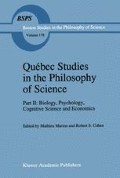Abstract
A good way of characterizing what is usually called the 17th-century “revolution of modern science” is to focus on Galileo Galilei’s theory of explanation. As is well known, he set aside three of the four Aristotelian causes (material, formal and final causes) in order to couch all sound scientific explanations in terms of efficient causes. In the second half of the 19th century a new scientific revolution occurred with Darwin’s theory of evolution. As has been stated repeatedly, Darwinism also has something to do with the abandoning of teleology in science, as speciation is explained without any appeal to final causes. But in the last quarter of the 19th century a third scientific revolution occurred, this time in the social sciences. Many philosophers of science fail to notice or understand this intellectual event. This third scientific revolution is usually called the “marginalist revolution.” The transformation of political economy into pure economics, and progressively, into mathematical economics had at least two distinctive features. First, this revolution broke out simultaneously but independently in three different European countries: with Carl Menger (1840–1921) in Austria, with William Stanley Jevons (1835–1882) in England, and with Léon Walras (1834–1910), who, in 1870, was the first to hold the Chair of Political Economy at the University of Lausanne in Switzerland.1
Access this chapter
Tax calculation will be finalised at checkout
Purchases are for personal use only
Preview
Unable to display preview. Download preview PDF.
References
Bunge, Mario and Ardila, Rubén, 1987, Philosophy of Psychology, Springer, New York.
Carnap, Rudolf, 1956, ‘The Methodological Character of Theoretical Concepts’, Minnesota Studies in the Philosophy of Science I, 38–76.
Hands, D. Wade, 1984, ‘What Economics is Not: An Economist’s Response to Rosenberg’, Philosophy of Science 51, 495–503.
Hayek, Friedrich von, 1967, ‘The Results of Human Action But Not of Human Design’, in Studies in Philosophy, Politics and Economics, Routledge & Kegan Paul, London; University of Chicago Press, Chicago; University of Toronto Press, Toronto, chap. 6, pp. 96–105.
Nadeau, Robert, 1993, ‘Confuting Popper on the Rationality Principle’, Philosophy of the Social Sciences 23, 446–467.
Orléan, André, 1991, ‘La monnaie et les paradoxes de l’individualisme’ Stanford French Review 15.3, 271–295.
Orléan, André, 1992, ‘The Origin of Money’, in F. J. Varela and J.-P. Dupuy (eds.), Understanding Origins. Contemporary Views on the Origin of Life, Mind and Society, Boston Studies in the Philosophy of Science, Vol. 130, Kluwer Academic Publishers, Dordrecht/B oston/London, pp. 113–143.
Rosenberg, Alexander, 1980a, ‘Obstacles to Nomological Connection of Reasons and Actions’, Philosophy of Social Sciences 10, 79–91.
Rosenberg, Alexander, 1980b, Sociobiology and the Preemption of Social Science, The John Hopkins Press, Baltimore.
Rosenberg, Alexander, 1983, ‘If Economics Isn’t Science, What Is It?’ Philosophical Forum 14, 296–314.
Rosenberg, Alexander, 1986, ‘What Rosenberg’s Philosophy of Science Is Not’, Philosophy of Science 53, 127–132.
Rosenberg, Alexander, 1988, Philosophy of Social Science, Westview Press, Boulder, CO.
Rosenberg, Alexander, 1992, Economics: Mathematical Politics or Science of Diminishing Returns? University of Chicago Press, Chicago.
Vaughn, Karen, 1980, ‘Does It Matter That Costs Are Subjective?’, Southern Economic Journal 47, 702–715.
Author information
Authors and Affiliations
Editor information
Editors and Affiliations
Rights and permissions
Copyright information
© 1996 Kluwer Academic Publishers
About this chapter
Cite this chapter
Nadeau, R. (1996). Economics and Intentionality. In: Marion, M., Cohen, R.S. (eds) Québec Studies in the Philosophy of Science. Boston Studies in the Philosophy of Science, vol 178. Springer, Dordrecht. https://doi.org/10.1007/978-94-009-0113-1_10
Download citation
DOI: https://doi.org/10.1007/978-94-009-0113-1_10
Publisher Name: Springer, Dordrecht
Print ISBN: 978-94-010-6537-5
Online ISBN: 978-94-009-0113-1
eBook Packages: Springer Book Archive

